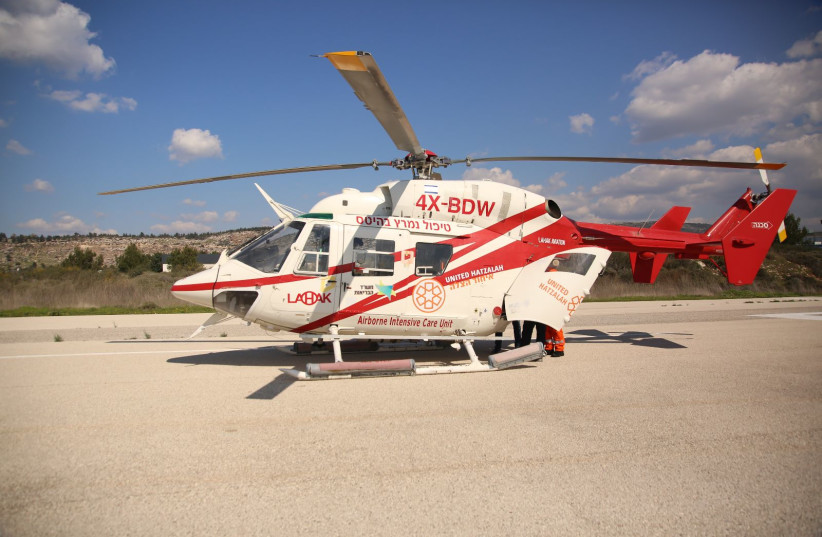United Hatzalah inaugurates air medical unit with three Medevac helicopters

United Hatzalah of Israel (UH) inaugurated this week its air medical unit comprised of three helicopters and 30 flight paramedics.
With occasional flooding in the South, terror attacks, car accidents and other disasters, enough helicopters with trained staff should be on duty 24 hours a day. One such unit will become fully operational as of March 12.
But the Medevac flying ambulances rented by Magen David Adom (MDA), which have been located in the north and south of the country, are not enough, especially when they have to be repaired and the helicopters are needed in other parts of the country. Sometimes, IDF copters are called in, but their first priority is military training.
United Hatzalah of Israel (UHI) inaugurated its air medical unit this week, comprised of three helicopters and 30 flight paramedics. The unit will provide immediate air medical assistance in the north, center and south of Israel.
The helicopters, flown by pilots who previously served in helicopter units of the Israeli Air Force (IAF), will be staffed by UHI paramedics, all of whom received extensive training with the airborne vehicles and evacuation techniques.
Health Ministry director-general Moshe Bar-Simon said the ministry approved United Hatzalah’s Medevac operations with the Lahak company and that UH is required to coordinate its flights and rescues with MDA. The ministry spokeswoman, Shira Solomon, stated that other reports claiming that the ministry prohibited the UH rescues was not true.
What is special about the Medevac flying ambulances?
The helicopters are specially equipped to provide emergency transport by air of patients in critical condition and are outfitted with special equipment from the Swiss company Bucher Industries.
Flight paramedics will also be outfitted with bodycams that transmit live footage of the scene to UHI’s Dispatch and Command Center, allowing for collaboration with hospitals and doctors who will be able to provide special instructions during treatment and evacuation of patients from the field.
The helicopters come with state-of-the-art medical equipment and will be staffed at all times by two flight paramedics from the unit.
“These helicopters now join our fleet of medical response vehicles which include boats that provide coverage on the Kinneret; ATVs for rescues that take place in mountainous areas, beaches, and areas with difficult terrain; and other specialized vehicles that we equip our search and rescue units with.”
The specialized unit offers a faster emergency medical response, he said, by providing quicker evacuations to emergencies caused by terror attacks or other traumatic cases across the country. “With just one phone call from the scene of a critical emergency, the helicopters from our air medical unit will be dispatched to the location of the emergency with a professional and highly skilled staff on board that will save more lives.”
The director of UH’s air medical unit, Dana Nagler added: “The very moment in which an emergency is received that requires the specialized care and transport of the air medical unit, our Dispatch and Command Center will send the closest helicopter, which will arrive at the scene in mere minutes.
"After providing initial medical care in the field and making all the necessary preparations for medevac transport, the patient will be taken by the flight paramedics into UH’s helicopter and transported to the most appropriate hospital or medical center to receive the highest level of care possible. The hospital will be updated with regard to the inbound patient, their condition, and receive as much information as possible prior to the patient’s arrival."
Jerusalem Post Store
`; document.getElementById("linkPremium").innerHTML = cont; var divWithLink = document.getElementById("premium-link"); if (divWithLink !== null && divWithLink !== 'undefined') { divWithLink.style.border = "solid 1px #cb0f3e"; divWithLink.style.textAlign = "center"; divWithLink.style.marginBottom = "15px"; divWithLink.style.marginTop = "15px"; divWithLink.style.width = "100%"; divWithLink.style.backgroundColor = "#122952"; divWithLink.style.color = "#ffffff"; divWithLink.style.lineHeight = "1.5"; } } (function (v, i) { });


